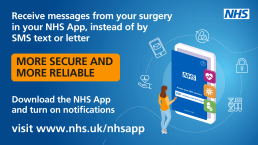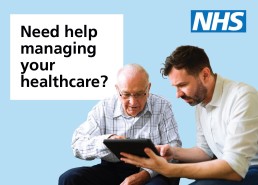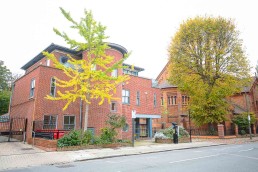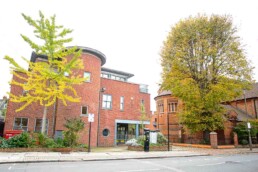NHS App Messaging Service
You can now receive messages through the NHS App Messaging Service.
This is a convenient and secure way for the practice to send you messages about your care.
What to expect from messages
We will send you:
- appointment reminders
- changes to practice services
- Health questionnaires
We will only send you a message if we need to contact you, for example if we have an update about your care.
We may continue to send you some information by SMS (text) message while we transition to using the NHS App Messaging Service.
If you do not want to receive messages from the NHS App Messaging Service
Contact the surgery to discuss your preferred contact method.
How to check if you have a message
You will receive messages, in 'View messages from your GP surgery and other NHS Services.'
The best way to keep up with your messages is to download the NHS App on Google Play or the App Store and turn on notifications.
To check your messages:
- Log in to the NHS app.
- Go to View your messages.
- Select View messages from your GP surgery and other NHS Services.
- Then select [GP surgery name].
Get NHS App notifications when we send you a message
To turn on notifications:
- Log in to the NHS app.
- Go to More.
- Select Account and settings.
- Then select Manage notifications.
- Use the toggle to turn notifications on or off.
You will see a new notification from the NHS App the next time we send you a message. Your notifications will tell you that you have a new message from your GP.
You will still receive our messages if your notifications are turned off, but you will not see a notification on your device when you have a new message.
How to contact Thurleigh road practice
You can make contact with us by:
- Online consultation forms https://florey.accurx.com/p/H85114
- phone 020 8675 3521
Your privacy while using the NHS App
If you want to find out how the NHS uses your information, read the NHS account privacy policy.
Adult Proxy Access
I want someone to help me with my GP services
Do you need help managing your healthcare?
You can ask a trusted person to apply on your behalf using this service, if you are both aged 16 or over and both registered at the same GP surgery, which we are taking part in the trial. Talk to them about what you want them to be able to help you with, and give them the details they need to apply.
Invite your trusted person to find out more about applying for access to another patient's GP services on the NHS website.
This service is designed and run by the NHS, so your personal information is safe.
The NHS is trialling a new service where you can apply online for proxy access. You can only use this service if your GP surgery is taking part in this trial.
You will need to use your NHS login. If you do not have one yet, you can set one up as part of your application.
Spring Bank Holiday
Spring Bank Holiday
We will be closed on Monday 29th May 2023
All repeat prescription requests for confirmed availability prior to the bank Holiday weekends must be submitted by 4.30pm on Wednesday 24th May All other requests will be dealt within our usual timeframe.
Prescription requests - we ask for you to either request using patient access, NHS App or through our website link to patient query. Reminder from 1st May no Emails from patients will be reviewed or processed.
Outside of our normal opening hours please call 111.
Please only call 999 if it is a life-threatening emergency.
You could also consider using your local pharmacy for non-urgent Health advice.
| Pharmacy Name | Address | Postcode | Telephone Number | Spring B/Holiday 29.05.23 |
| Fulham Pharmacy | 608 Fulham Road, | SW6 5RP | 020 7736 4126 | 10:00-14:00 |
| Medicine Chest | 413-415 Kings Road | SW10 0LR | 020 7351 1142 | 10:00-14:00 |
| Vitelow Pharmacy | 26 Clapham Rd | SW9 0JG | 020 7735 2730 | 12:00-16:00 |
| Rays Chemist | 167 London Road, Mitcham | CR4 2JB | 020 8648 0886 | 10:00-14:00 |
| Tooting Pharmacy | 175 Upper Tooting Road | SW17 7TJ | 020 8672 5843 | 10:00-14:00 |
| Barkers Chemist | 49 Falcon Road, | SW11 2PH | 020 7228 1701 | 10:00-14:00 |
| Westbury Chemist | 84-90 Streatham high road | SW16 1BS | 020 8769 1919 | 09:00-00:00 |
For other Local Pharmacy opening hours please check www.nhs.uk/service-search/find-a-pharmacy or by calling NHS 111
Mayday and the Kings coronation Bank Holidays
Mayday and the Kings coronation Bank Holidays
We will be closed on Monday 1st and 8th May
All repeat prescription requests for confirmed availability prior to the bank Holiday weekends must be submitted by 4.30pm on Wednesday 26th April and Wednesday 3rd May. All other requests will be dealt within our usual timeframe.
Prescription requests - we ask for you to either request using patient access, NHS App or through our website link to patient query. Reminder from 1st May no Emails from patients will be reviewed or processed.
Outside of our normal opening hours please call 111.
Please only call 999 if it is a life-threatening emergency.
You could also consider using your local pharmacy for non-urgent Health advice.
| Pharmacy Name | Address | Postcode | Telephone Number |
May day 01.05.23 |
Kings Coronation
08.05.23 |
| Fulham Pharmacy
|
608 Fulham Road, Fulham | SW6 5RP | 020 7736 4126 | 10:00-14:00 | 10:00-14:00 |
| Medicine Chest
|
413-415 Kings Road | SW10 0LR | 020 7351 1142 | 10:00-14:00 | 10:00-14:00 |
| Vitelow Pharmacy
|
26 Clapham Road, Clapham | SW9 0JG | 020 7735 2730 | 12:00-16:00 | 12:00-16:00 |
| Rays Chemist
|
167 London Road, Mitcham | CR4 2JB | 020 8648 0886 | 10:00-14:00 | 10:00-14:00 |
| Tooting Pharmacy | 175 Upper Tooting Road | SW17 7TJ | 020 8672 5843 | 10:00-14:00 | 10:00-14:00 |
| Barkers Chemist
|
49 Falcon Road, Battersea | SW11 2PH | 020 7228 1701 | 10:00-14:00 | 10:00-14:00 |
| Westbury chemist
|
84-90 Streatham high road | SW16 1BS | 020 8769 1919 | 09:00-00:00 | 09:00-00:00 |
Why are GP practices working differently?
GP practices are open but the pandemic is not over
In South West London there are still thousands of people getting Covid-19 every week, with many being admitted into hospital and some into intensive care. Local GP practices treated people throughout the Covid lockdowns and continue to do so. We must make sure our practices are safe for our staff and protect patients who need to attend in person.
How are practices working now?
When people need seeing face to face this should happen as quickly and safely as possible and it is important that people are assessed first to decide who needs:
- to be seen in person by one of the team
- a phone consultation
- a video consultation
- help from a community pharmacy or another health service
We also want to avoid asking people to travel to practices, where they may come into contact with unwell or infectious people, when this is not essential.
How can I contact my GP?
You can still telephone your GP practice but, if your practice offers it and you are able to, the best thing to do is to use an online service on the practice website. You will then be contacted with the best appointment for you.
If you need help with minor injuries at any time or urgent care when your GP practice or pharmacy is closed visit 111.nhs.uk or dial 111. 111 can also book out of hours appointments.
You can access NHS 111, contact your practice and get your Covid Pass using the NHS App. Search NHS App in your app store.
Why do receptionists ask personal questions?
GP reception staff are skilled professionals and ask questions to make sure you see the right person at the right time and treat all information confidentially. If you don’t want to speak on the phone, you can use the online service on the practice website, if your practice offers this.
I wanted to see my GP, so why am I seeing someone else?
Many GP practices now include a range of professionals like physician’s associates, nurses, practice pharmacists and paramedics who can help you. This means you can often be seen more quickly and if you then need to be seen by your GP they will organise this for you.
Where else can I get help?
Always dial 999 in a life-threatening emergency.
Visit www.nhs.uk for advice on common symptoms and a list of local services or speak to your community pharmacist first for advice on minor illnesses nhs.uk/service-search/find-a-pharmacy.
Letter to all patients
Dear patient
Firstly we’d like to thank you for your patience and understanding during what has been an extremely challenging last 18 months. We have been working hard to offer you a good level of service and understand there have been occasions where you feel things haven’t gone the way you’d like them to.
We have taken on quite a bit of feedback from patients over the period of the pandemic into how we provide services to our patients. The way we provide care for you has understandably changed due to the impact of COVID-19.
We have though, remained open throughout the pandemic and have continued to see patients face to face when needed.
We have also added in new work streams to make it easier for other patient cohorts to contact a doctor or nurse. These include video appointments and text message communications which have both been warmly embraced and received very good feedback from our patients.
However, in line with instructions from NHS England we have had to change to a triage model whereby all calls are triaged at the point of contact before being assessed by a member of the clinical team. The clinician in charge then processes this and books an appointment based on clinical need and any potential COVID risk to other patients and staff.
I can assure you that reception staff do not make this call. All calls are discussed with a partner and assessed immediately. They are then dealt with based on clinical need and an appropriate time frame for an appointment is found.
We have found this system to work well in freeing up a lot of emergency slots on the day - resulting in patients with an actual emergency medical need, being able to see a doctor or a nurse on the day. Previously these appointments were being booked inappropriately at times.
Overall the response has been good and we will continue to review and improve our workflow systems to enable us to offer prompt medical care when needed. We are seeing a huge increase in clinical demand at the moment and are continually assessing how best we can service this.
We continue to see patients face to face when appropriate and will continue to assess how this can be best managed as the pandemic evolves.
Whilst he vaccination programme has been very successful and life is beginning to return to something like normal - a word of caution. We are unfortunately seeing quite a few cases of double vaccinated individuals contracting COVID-19 (in most cases the delta variant). It is for this reason that we continue to operate the way we do, with safeguards in place to keep both our patients and our staff safe. It has not been easy but we do this with the best of intent.
Please do remember that this virus is still looming and that is why we remain cautious.
Thank you for your feedback and I hope you find this explanation helpful.
The partners
TRP
Thank you
Dr Jonathan Christopher





